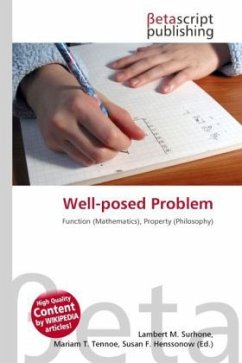High Quality Content by WIKIPEDIA articles! Mathematicians (and those in related sciences) very frequently speak of whether a mathematical object a function, a set, a space of one sort or another is "well-behaved" or not. The term has no fixed formal definition, and is dependent on mathematical interests, fashion, and taste. To ensure that an object is "well-behaved" mathematicians introduce further axioms to narrow down the domain of study. This has the benefit of making analysis easier, but cuts down on the generality of any conclusions reached. Concepts like non-Euclidean geometry were once considered ill-behaved, but are now common objects of study. In both pure and applied mathematics (optimization, numerical integration, or mathematical physics, for example), well-behaved also means not violating any assumptions needed to successfully apply whatever analysis is being discussed. The opposite case is usually labeled pathological.
Bitte wählen Sie Ihr Anliegen aus.
Rechnungen
Retourenschein anfordern
Bestellstatus
Storno








